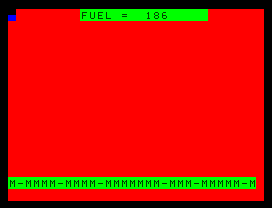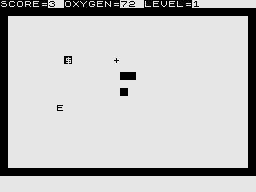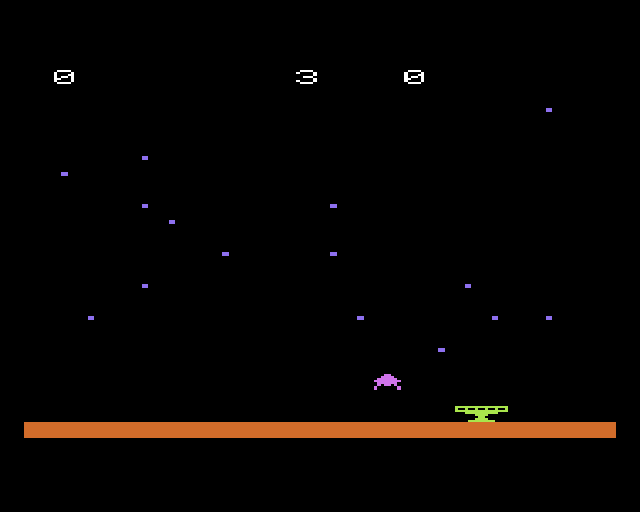Retro Replay Review
Gameplay
Cassette 50 is a sprawling anthology of previously unreleased titles, each built in BASIC to squeeze 270K of data onto a single tape. From the moment you hit play, you’re greeted with a menu of fifty mini-games ranging from rudimentary arcade clones to primitive simulations. The sheer volume of content is impressive, but it quickly becomes clear that the package trades depth for breadth. Many games share similar mechanics—paddle-and-ball controls, simple mazes, or directional movement—so you’ll often find yourself repeating the same basic interactions in different visual wrappers.
(HEY YOU!! We hope you enjoy! We try not to run ads. So basically, this is a very expensive hobby running this site. Please consider joining us for updates, forums, and more. Network w/ us to make some cash or friends while retro gaming, and you can win some free retro games for posting. Okay, carry on 👍)
Despite their simplicity, these games occasionally surprise with inventive twists. “Motorway,” for example, tasks you with the morally dubious objective of running over pedestrians, making it both controversial and oddly compelling as an early experiment in dark humor. The collection’s sports titles—basketball, motor racing, and even bowls—provide brief diversions, though they lack the polish of dedicated releases. A handful of strategic experiments, notably a Star Trek–inspired adventure, sprinkle in role-playing elements that require basic decision-making rather than twitch reflexes.
Input lag and slow screen redraws are constant reminders that you’re dealing with BASIC-era programming. Controls can feel unresponsive, and erratic collision detection often leads to frustrating deaths in games like “Muncher” (a Pacman clone) or “Breakout.” Yet the challenge can be oddly addictive: progressing from one subpar game to the next becomes part of the fun, and unlocking each title’s quirks fuels a compulsive “just one more” mentality—especially if you’re a retro enthusiast chasing nostalgia.
Graphics
Visually, Cassette 50 is an exercise in minimalism. Graphics are rendered in monochrome or two-color schemes, depending on your 8-bit platform, and every game bears the telltale blockiness of BASIC’s character-based drawing routines. Sprites are little more than ASCII art in motion, and backgrounds consist of static lines or repeated characters. There’s no palette swapping, no smooth scrolling—just raw, unfiltered retro charm at its most basic level.
That said, there’s a certain beauty in its simplicity. Watching crude representations of tanks trundle across the screen or guiding a dot through a maze taps into the same joy that made early home computers so magnetic. Occasional color flashes and beeps lend a lo-fi arcade ambiance, even if the visual fidelity can’t match true arcade or cartridge-based productions of the era. Collectors and programming hobbyists will appreciate the DIY aesthetic: these are raw code experiments you can almost hear being typed in real time.
While modern standards render these graphics practically unplayable for many, it’s important to judge Cassette 50 on its own terms. The visual feedback is immediate and unpretentious. If your expectations are anchored in high-definition sprites and fluid animations, this compilation will disappoint. But if you’re curious about the origins of homebrew gaming or enjoy decoding BASIC listings, the blocky simplicities here serve as both nostalgia trip and coding primer.
Story
Cassette 50 isn’t designed around an overarching narrative; it’s essentially a sampler platter of micro-experiences. Unless you count the brief premise of the Star Trek–like strategy game, there’s no unifying plot thread to tie the fifty titles together. Each mini-game introduces its own minimal context—rescue the princess, collect dots, outrun rivals—but none go beyond a sentence or two of exposition.
This lack of storytelling can be refreshing. You’re not burdened by intricate lore or convoluted quests—just immediate arcade-style challenges. On the flip side, players seeking emotional engagement or character arcs will come away empty-handed. Even the most elaborate entry, a turn-based Star Trek homage, offers only text-driven mission briefings without any real sense of progression or world-building.
Still, the absence of story gives Cassette 50 a unique experimental feel, as though you’re sampling fifty developer prototypes rather than polished releases. Each program reads like a coding exercise, showcasing varying interpretations of familiar gameplay formulas. If narrative immersion isn’t your priority, this rapid-fire collection can be oddly liberating—jump into any game, compete for a high score, then move on without losing a storyline to follow.
Overall Experience
Cassette 50’s greatest selling point is its audacious quantity. Fifty games on one cassette was unheard of when it was released, and the novelty remains its chief allure. The collection is perfect for retro purists, programming enthusiasts, or collectors who want a snapshot of early home computer experimentation. It’s a historical oddity more than a must-have gaming collection.
However, modern gamers should brace for frustration. Unresponsive controls, repetitive designs, and rudimentary AI mean that many titles feel more like tech demos than cohesive games. You’ll find hidden gems—pinball variants with surprisingly good physics, for instance—but they’re drowned in a sea of simplistic clones. Expect to spend equal time skipping unwinnable screens and marveling at the occasional spark of creativity.
Ultimately, Cassette 50 is a mixed bag that rewards curiosity more than skill. If you’re shopping for tight mechanics, narrative depth, or graphical flair, look elsewhere. But if you cherish the quirks of BASIC-era gaming, want to tinker with source code dumps, or just love sampling esoteric software curiosities, this collection is an unfiltered window into the dawn of homebrew development. Its value lies not in polished perfection, but in the wild diversity and raw potential captured on that unassuming tape.
 Retro Replay Retro Replay gaming reviews, news, emulation, geek stuff and more!
Retro Replay Retro Replay gaming reviews, news, emulation, geek stuff and more!









Reviews
There are no reviews yet.